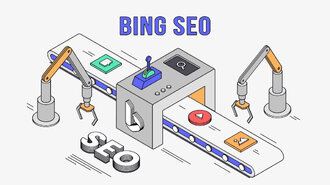The SEO industry is continuously evolving due to the implementation of the best AI SEO practices and the ever-changing algorithm of Google.
With the rise of artificial intelligence (AI), social media posts are now optimised to improve website rankings on the search engine results page (SERPs). Despite the increasing adoption of AI-powered tools in marketing campaigns, many businesses remain unaware of this technology shift
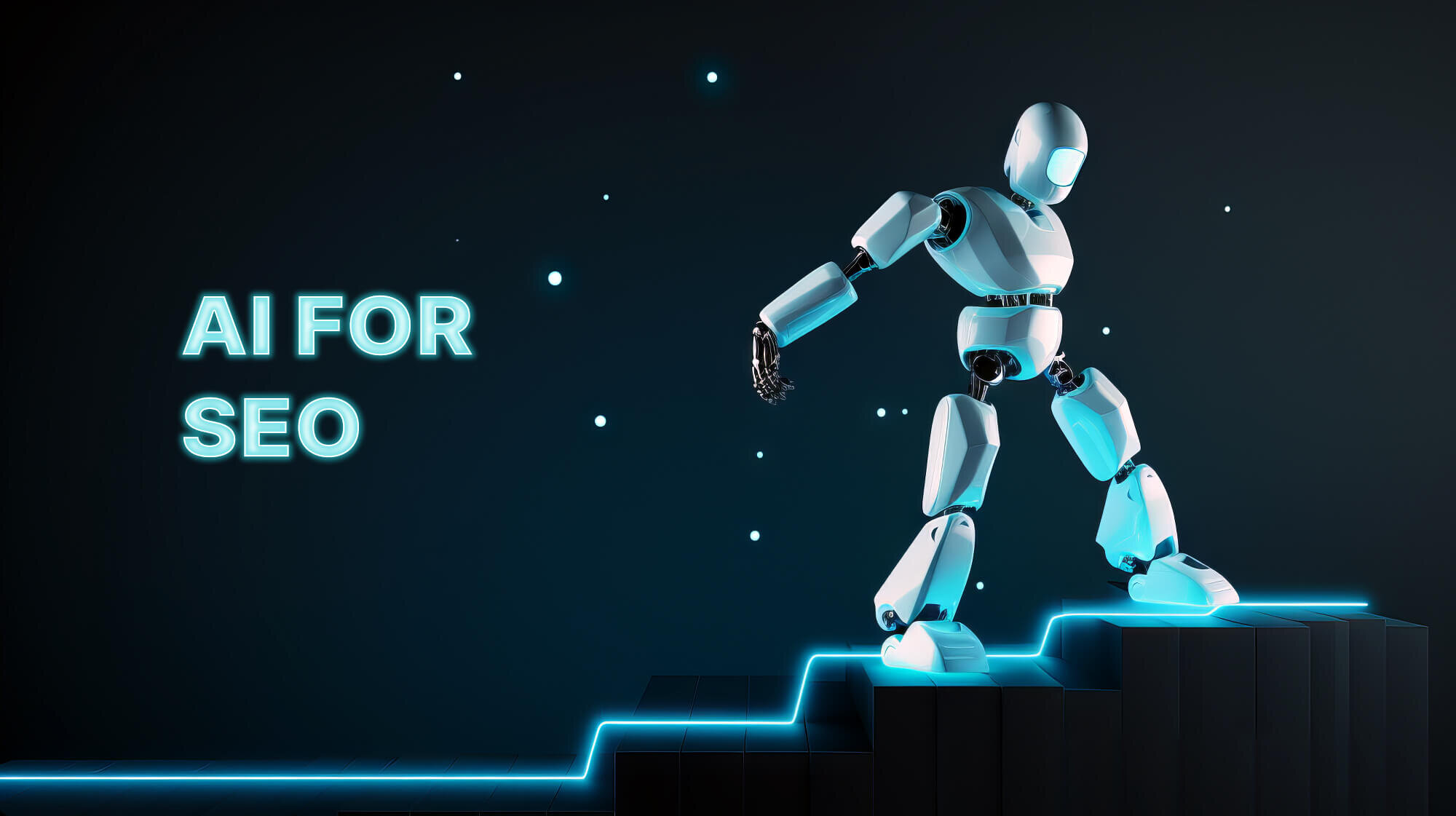
AI is expected to be the future of SEO, meaning it’s en route to changing the search engine permanently. Without leveraging AI-powered tools, ranking high in the SERPs would become challenging for every marketer or business owner.
Before diving headfirst into SEO, it’s vital to get a handle on the basics of AI and how it’s shaking up the industry. To navigate potential challenges, check out this in-depth guide, highlighting the incredible power of AI in SEO and uncovering strategies using AI-driven keyword research tools.
AI SEO: What Is AI?
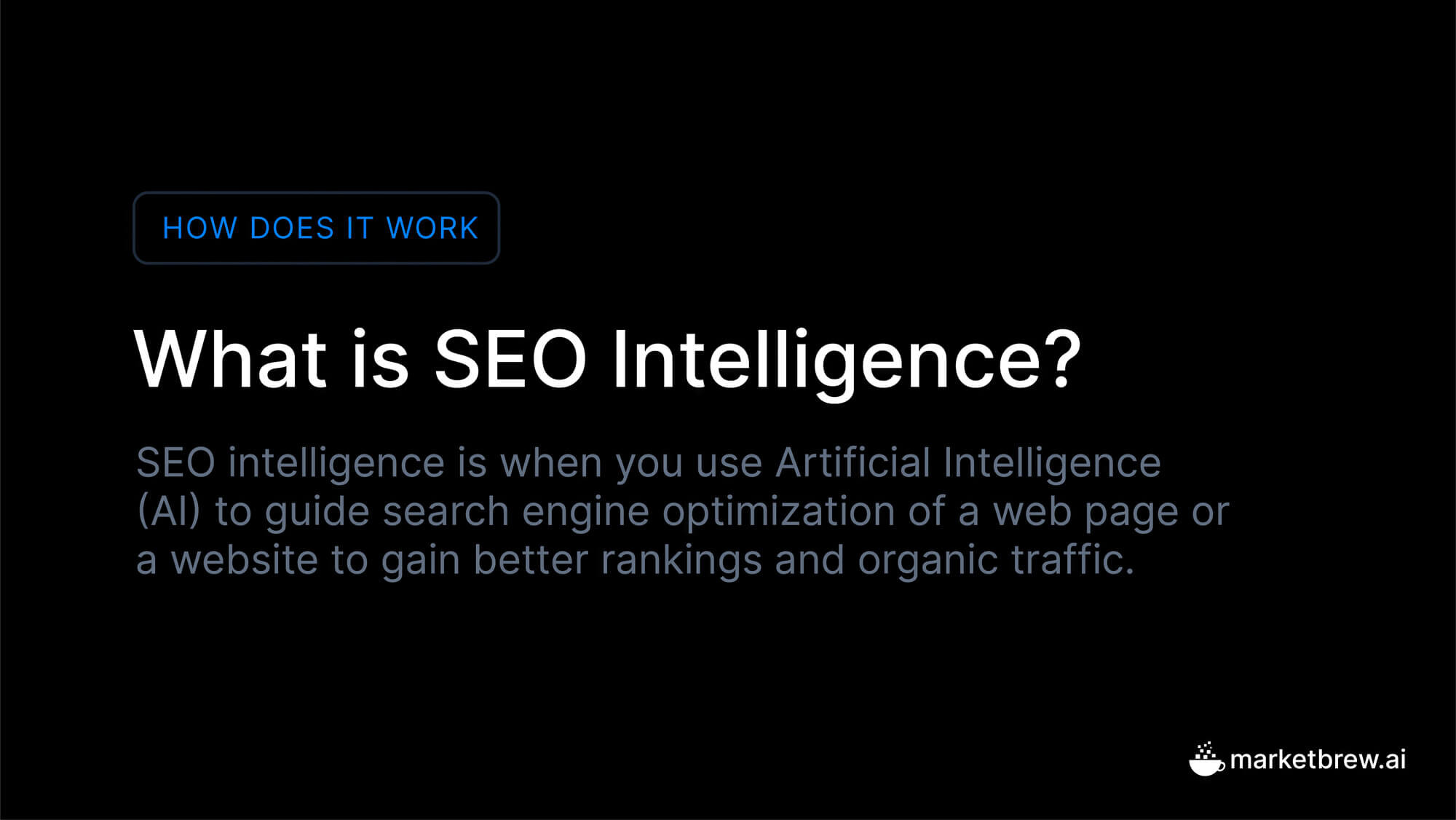
Artificial intelligence (AI) is an all-encompassing term for various cutting-edge technologies, including machine learning (ML), natural language processing (NLP), computer vision, and deep learning. These AI advancements play a pivotal role in identifying and utilising relevant keywords that optimise website content for improved search engine rankings
AI’s popularity has soared because it performs cognitive tasks faster and more efficiently than people can. This extends to content optimisation, with AI tools brilliantly enhancing website content to align with the constantly changing demands of search engine algorithms.
Interestingly, businesses that have integrated AI tools have grown significantly in the past years. We aren’t the only ones saying that — a recent survey recorded that 30% of businesses that deployed AI technology reported a 6 to 10% boost in revenue.
What Is AI Algorithm And Its Types
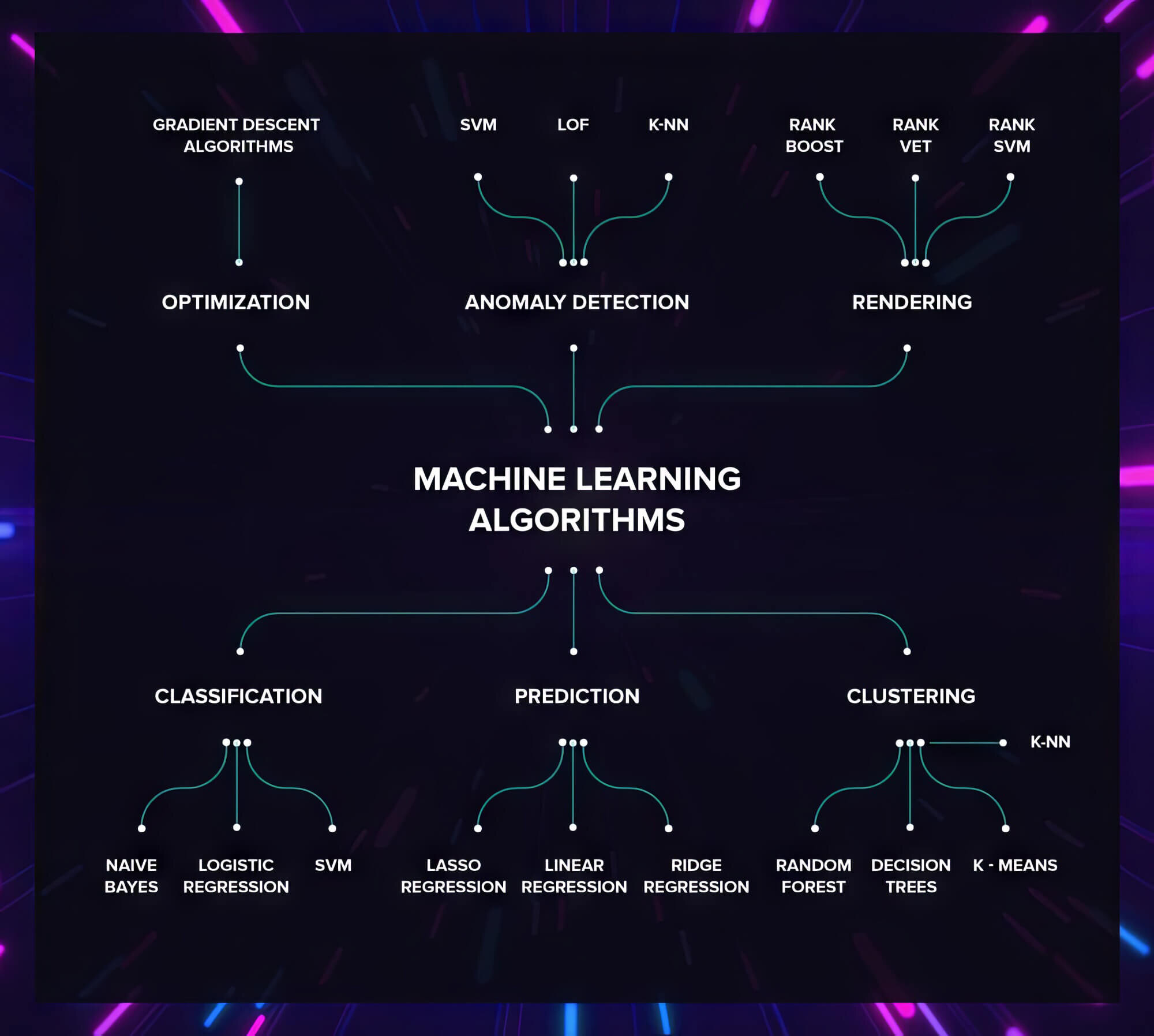
Contrary to popular belief, AI and AI algorithms are different from one another, and although they are tools, they serve different purposes.
An algorithm is a set of instructions that briefs a computer about what should be done. An algorithm can be as complex as solving a challenging mathematical equation or adding two numbers.
Deep learning algorithms and machine learning algorithms are two types of AI algorithms. The primary purpose of both these algorithms is to allow computers to make their own decisions via their acquired knowledge.
Some common types of AI algorithms are as follows:
- Dynamic programming — it calculates values based on formerly calculated values.
- Greedy algorithms — make the best decision but sometimes give rise to problems.
- Parallel algorithms — implemented simultaneously; suitable for large tasks divided into small portions.
- Sequential algorithms — ideal for tasks executed in a specific order, like data sorting.
AI And Its Role In SEO: How AI Is Changing SEO?
AI-powered SEO tools have revolutionised various aspects of digital marketing, encompassing SEO keyword research and creating high-quality content. By utilising these advanced tools, businesses can enhance their search engine rankings, resulting in improved traffic flow and higher conversion rates. Natural language processing (NLP) is a crucial component of AI that enables the interpretation and understanding of human language, facilitating accurate and effective SEO strategies.
AI can help businesses with the following tasks:
- Finding keywords
- Analysis and content creation
- Automating SEO work-flow
- Increasing organic traffic
- Content discovery using voice search
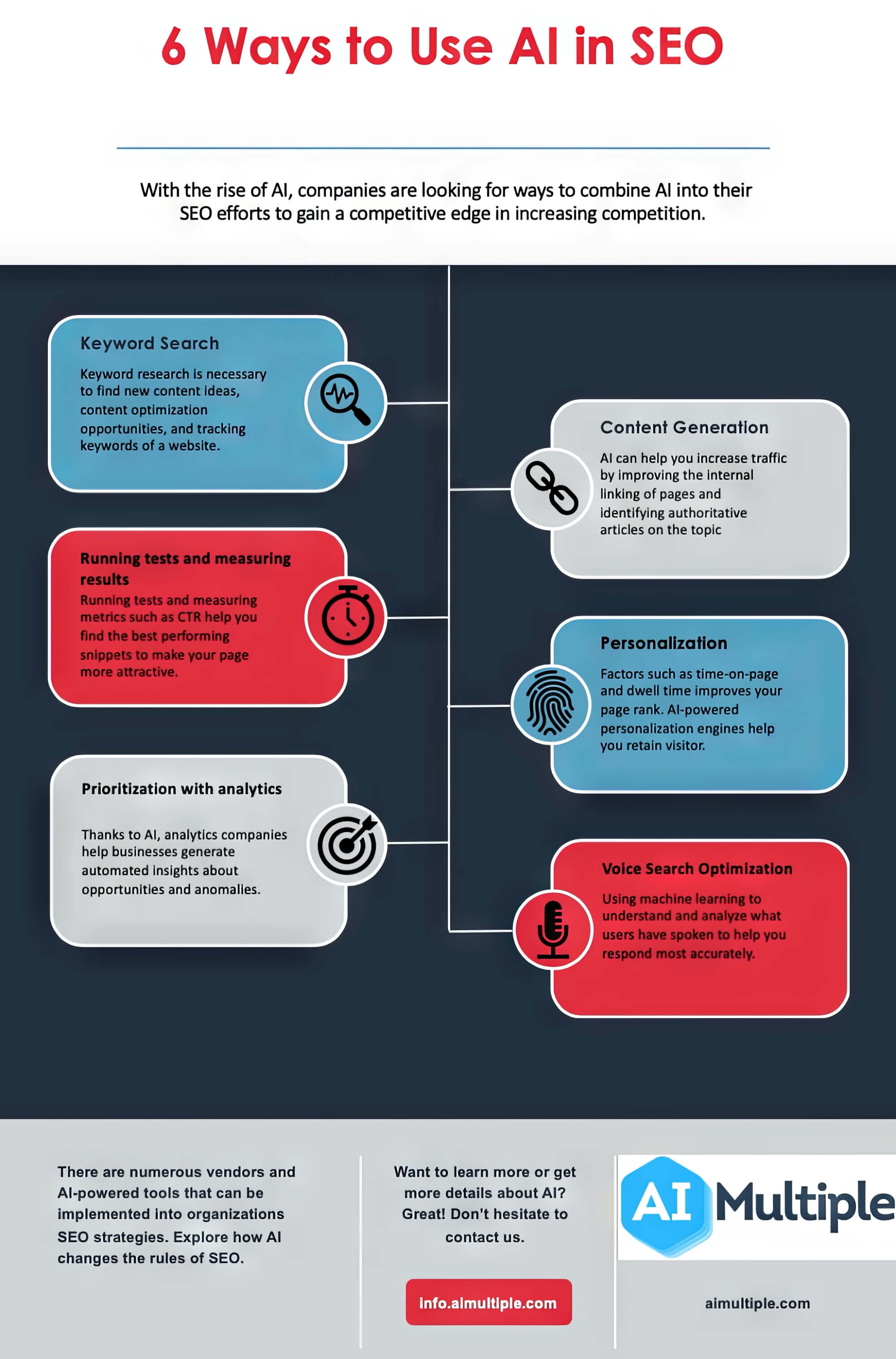
AI’s impact on search engines naturally leads us to ask about its effect on SEO. Simply put, AI is transformative, changing SEO by automating optimisation within digital marketing programs. This automation is a game-changer for marketers everywhere, boosting efficiency and outcomes dramatically.
This automation empowers marketing teams with greater precision, speed, and accuracy, ultimately boosting overall SEO productivity. To effectively harness the power of AI, businesses must develop a comprehensive content strategy that aligns with AI-driven SEO practices.
Furthermore, tackling inefficiency and meeting clients’ goals is easy with AI-assisted content curation and optimisation. With the rise of AI, SEO isn’t only about keyword stuffing because search engines are more inclined towards user intent.
So, every business needs to integrate AI into their marketing strategy to rank higher than the competition in AI-powered search engines.
AI And Website Ranking: How AI Can Improve The Ranking Of Your Website
1. Link Building
Grasping link flow across websites is crucial for marketers and business owners. AI can help reorganise internal links, directing link flow to crucial pages and cutting it back where it’s less needed. This strategic use of AI boosts page importance and visibility.
With AI tools, marketers can prevent link loss by identifying factors affecting the link flow and repairing them. Such AI SEO tools also be helpful in pushing traffic to pages with high conversion rates.
2. Voice Search
Typing queries or keywords in search engines has been the norm. However, there has been a shift to voice search in recent years, which is expected to grow more in future.
What led to this shift is that audiences prefer conversational queries over traditional keyword research. And since AI presents only one result against traditional search, which presents multiple search results, the competition to rank at the top is immense.
Integrating AI tools into your SEO strategy is the only obvious way to get your website featured in voice searches. Not only will it increase reader engagement, but it will also boost your search rankings.
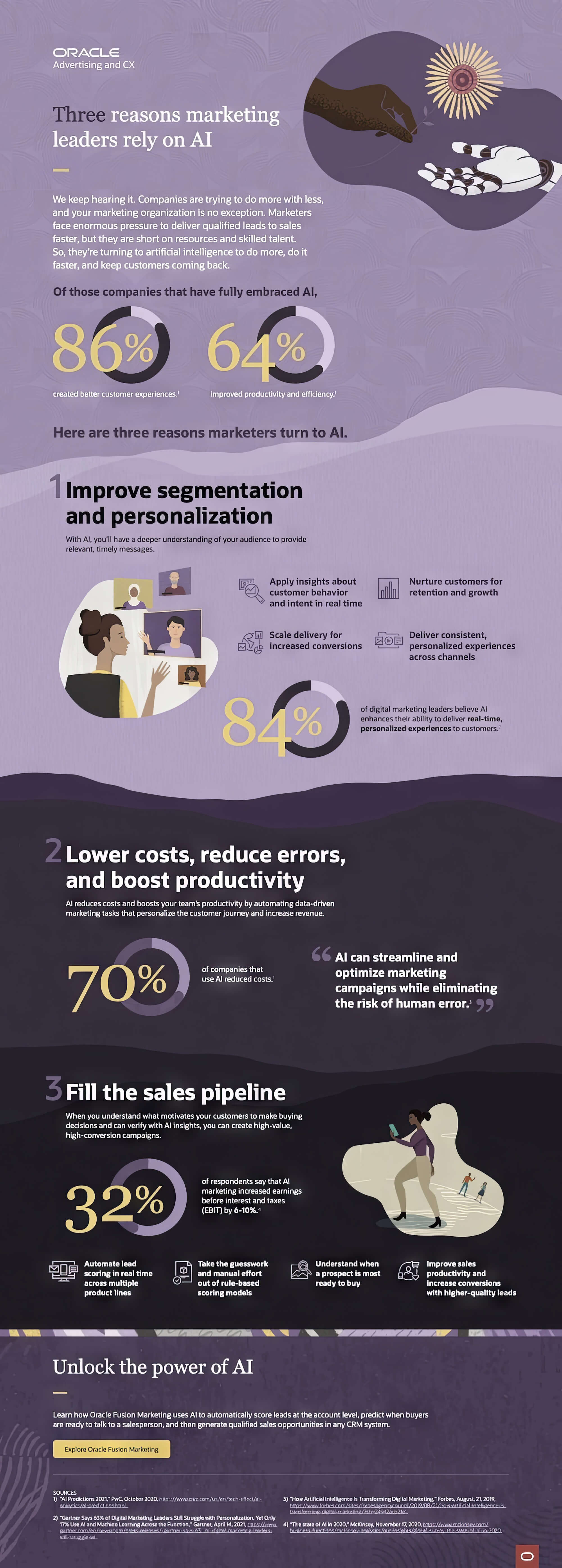
3. Optimise Content
There’s no other way to improve search rankings than by publishing high-quality content.
But, at times, businesses post content on their website, which is chock-full of errors. Content riddled with errors can lead to frustration in the readers; as a result, they will leave the post, increasing your bounce rates.
AI tools can prevent such issues by rectifying grammatical, punctuation and spelling mistakes and optimising your content.
4. SEO Audits
Conducting SEO audits can be challenging, but with the aid of suitable AI tools, it becomes a streamlined process. These tools efficiently assess keyword difficulty, enabling marketers to optimise their SEO strategies accordingly.
AI-powered SEO tools assist marketers in identifying areas of a website that require attention. These tools provide insights into keyword performance and highlight lost and new backlink opportunities, resulting in optimised content that improves website visibility and search rankings.
By deploying the appropriate AI SEO tool, businesses gain unique opportunities to attract valuable website search traffic. These tools enable the optimisation of meta descriptions effectively, enhancing the visibility and click-through rates of web pages in search engine results.
Applications Of AI In SEO: What Are The Advantages Of Integrating AI-Powered Tools?
AI has become a core part of Google’s ability to deliver search results that match what users are looking for. Plus, it helps SEO professionals crunch data and predict trends, fostering the development of highly tailored and engaging content ideas.
But is that the only advantage of AI in local SEO? Certainly not! This section will discuss the benefits businesses reap after implementing AI tools in SEO techniques.
1. Scale And Automate SEO Efforts
One of the significant benefits of AI for SEO is that it can automate various trivial tasks, which prove time-consuming for SEO teams. AI tools can help create and optimise SEO content, which would otherwise be challenging for SEO managers.
By deploying AI SEO software to create content, businesses can reduce the workload of the marketing teams; therefore, they can focus on more critical tasks.
2. Develop A Rock-Solid SEO Strategy
Developing an effective SEO strategy is no easy feat unless you have up-to-date data on your screen.
Instead of researching and brainstorming ideas, turning to AI tools will be hassle-free. Besides finding the right target keyword, AI can help marketers build a solid SEO strategy.
Various tools can provide useful recommendations when creating content because, through those recommendations, topic gaps can be avoided, and you will also outrank your competitors.
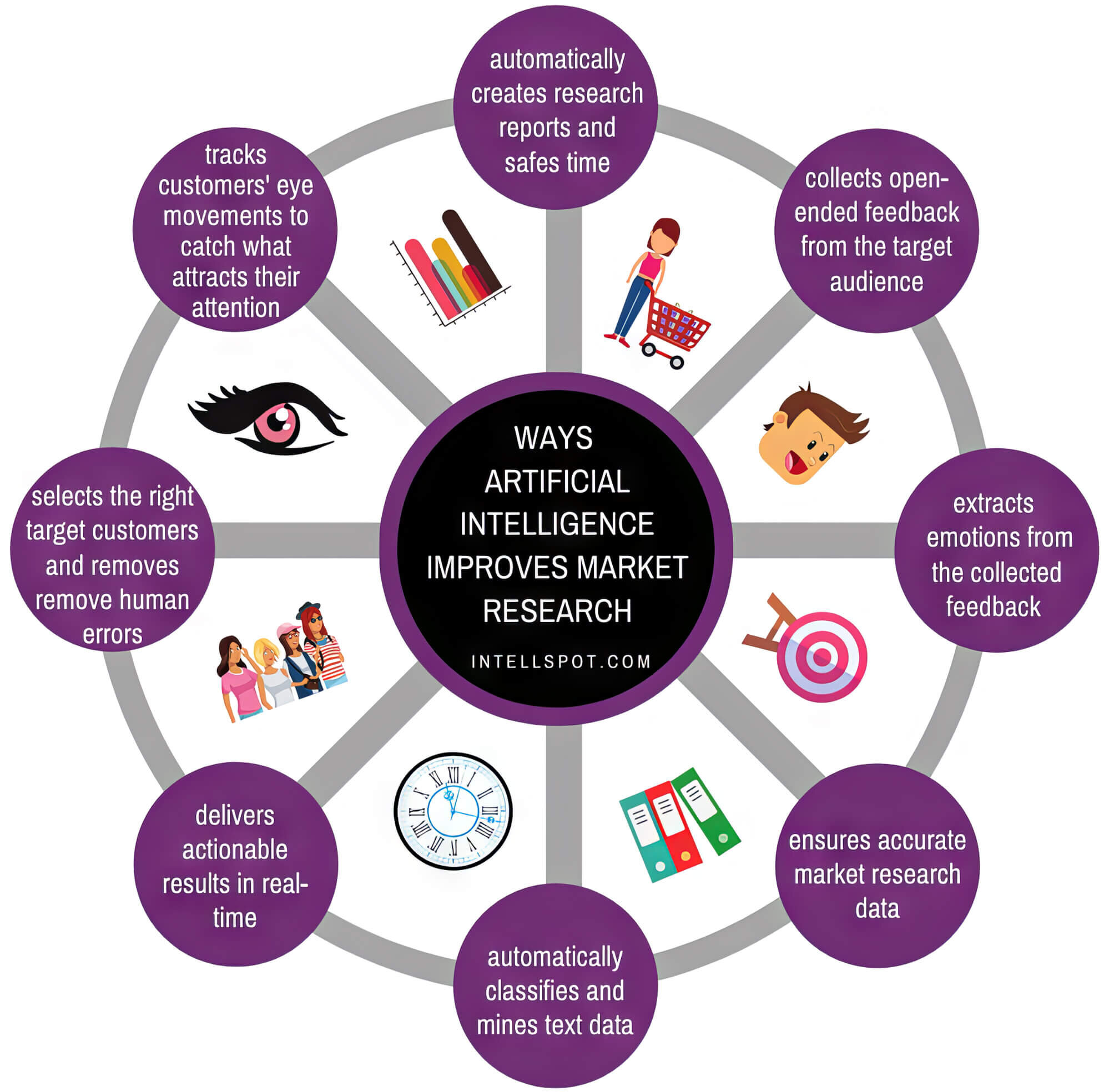
3. SEO Content Creation
One advantage of AI in SEO strategy is that AI-powered tools can help businesses create content.
An AI technology, natural language generation (NLG), has progressed to the point where artificial intelligence tools can generate pieces of content of hundreds of words. Such pieces of content are unique and engaging with zero plagiarism.
In no way does that eradicate the need for human writers — AI may be capable of automating various tasks, but its content lacks emotional connection. And that’s why human writers must turn those automated pieces into compelling ones.
4. Content Optimisation
Using AI in your SEO strategy can also achieve quick victories on individual articles. From the topics you should cover to the length of the piece, AI will walk you through everything you need to know to outperform your competitors.
It can even generate a list of topic recommendations using content briefs for content optimisation. Not just that, but it can also share where to add links and which questions to answer in your content.
5. Handle Large Volumes Of Data
SEO involves studying large volumes of data, from specific keywords and keyword clusters to website traffic.
Initially, SEO data can be out of reach for humans. However, AI algorithms manage large datasets effortlessly, offering marketers crucial insights that are otherwise hard to obtain, aiding strategic decisions.
AI Tools For SEO
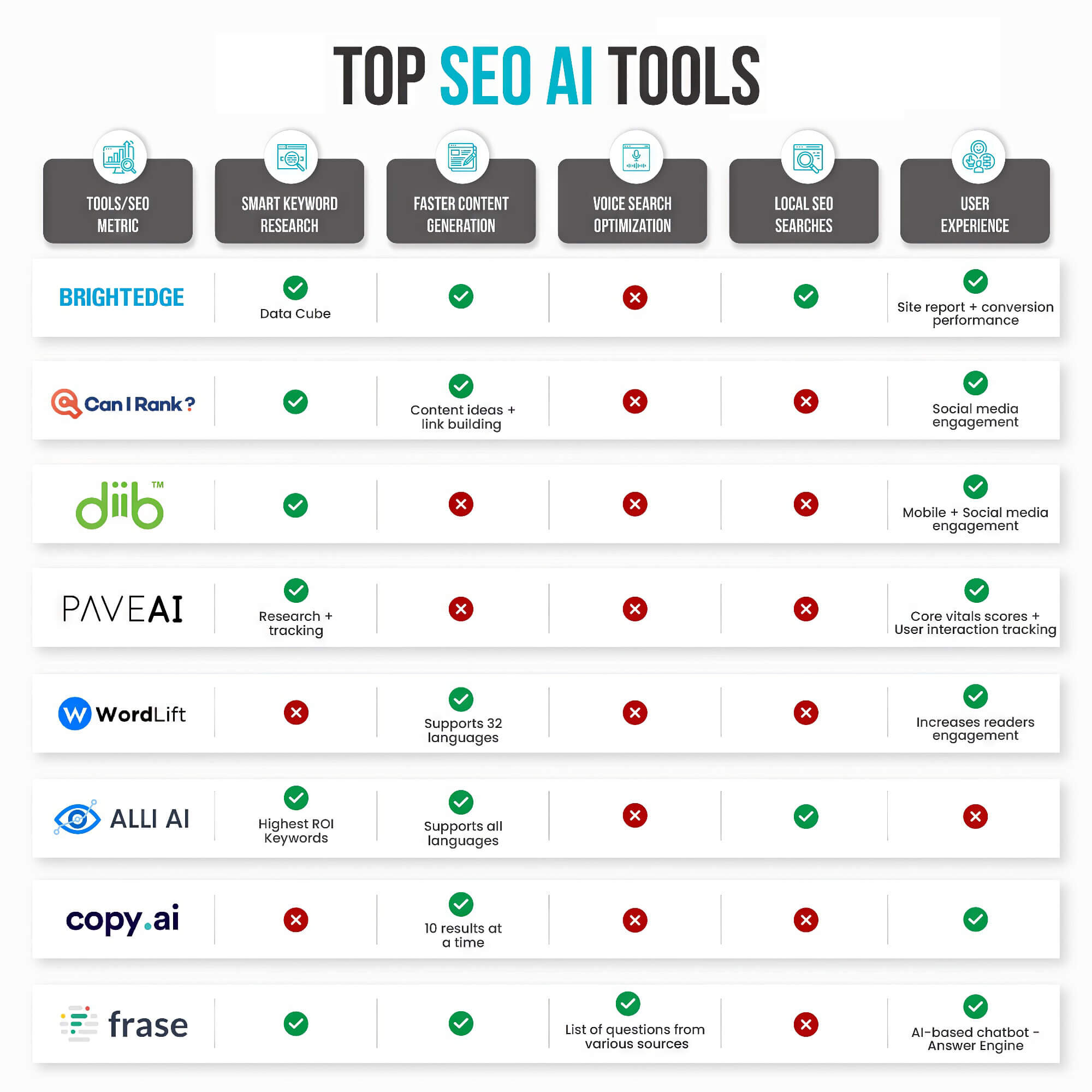
Here’s a quick overview of AI-powered tools businesses can consider improving their SEO strategy.
1. AI For E-Commerce SEO
- Alli AI for optimising website within minutes
- SurferSEO for boosting SEO traffic and ranking high in the SERPs
- Frase for creating content briefs
2. AI For Keyword Research In SEO
- RankIQ for in-depth keyword research and creating blog posts outline
- Diib for traffic and SEO-related insights
3. AI In Link-Building For SEO
- Linkhunter for automating link-building tasks
- NeuronWriter for internal linking
- Ahrefs for information on the backlinks of your competitors and checking broken links
AI And SEO Trends
1. AI Software/Tools Content Writing
Since its inception, AI has come a long way — it has also paved its way in the field of content writing.
With the help of various tools powered by AI software, creating high-quality content won’t be time-consuming. Instead, businesses can generate new ideas, edit existing content and optimise them without manual labour.
The best part is that Google needs to distinguish AI-generated content from those written by writers. Once your content is ready, human writers can fill the gaps, which will add a human touch to them.
To adapt to this trend, familiarise yourself with artificial intelligence tools on the market and learn basic SEO principles to create content aligned with those practices.
2. AI-Generated Images Are Soaring In Popularity
Though there are no official statements, AI-assisted visuals may impact the SEO trends in 2025. Using AI-powered tools, creating images will no longer be time-consuming but efficient and quick.
As a marketer or a business owner, you only need to share details with AI tools, and they will create images per your preference. Remember, the more details you share, the better images will be.
Like human-generated images, AI images contain details, so they get featured in the SERPs whenever relevant to the query.
3. AI Can Predict The Rankings Of Websites In The SERPs
On-page optimisation, social signals and backlinks — a lot goes into determining the ranking of a website in the search engine page results.
Because there are a lot of factors, understanding which activity can rank you at the top of the search engine results is impossible for a human. But AI can predict website rankings in search engines by studying or scanning every factor used to determine them.
With the SERP data, businesses can identify the loopholes in their marketing activities, rectify them and develop a solid SEO strategy.
4. AI Allows Marketers To Track And Analyse Competitors
Keeping an eye on your competitors’ SEO efforts can greatly strengthen your strategy, helping you stay a step ahead.
However, keeping track of every change they make manually is a challenging and labour-intensive task. This process has become a lot easier with AI, but manual effort is still required.
In future, AI-powered tools are expected to identify the amendments made by the competition in their SEO strategies. Not just that, but they will also analyse the aftermath of those changes on the ranking of your website.
Using AI for SEO
As we progress through 2025, AI-generated visuals and the content will play an increasingly significant role in website rankings on the SERPs. Embracing AI-driven web design will be crucial for businesses seeking to improve their online visibility and enhance user experience.
By leveraging AI tools or software, marketers can research content-specific keywords, generate blog post outlines, analyse their competitors’ performance and develop a robust strategy to outrank them. The best part is that your marketing team need not spend hours brainstorming ideas for high-quality content.
AI-powered tools can do that; of course, your writers can edit them to ensure it hits the heartstrings of your target audience. To sum it up, artificial learning is reshaping the SEO industry — so it’s increasingly essential for businesses to integrate AI-powered tools in their SEO strategies.
And remember, the trick of the trade lies in using the right AI-powered tools; otherwise, none of your blog posts or landing pages drives traffic to your site. Are you finding it all too overwhelming? Getting in touch with a digital marketing company will be the best bet.



